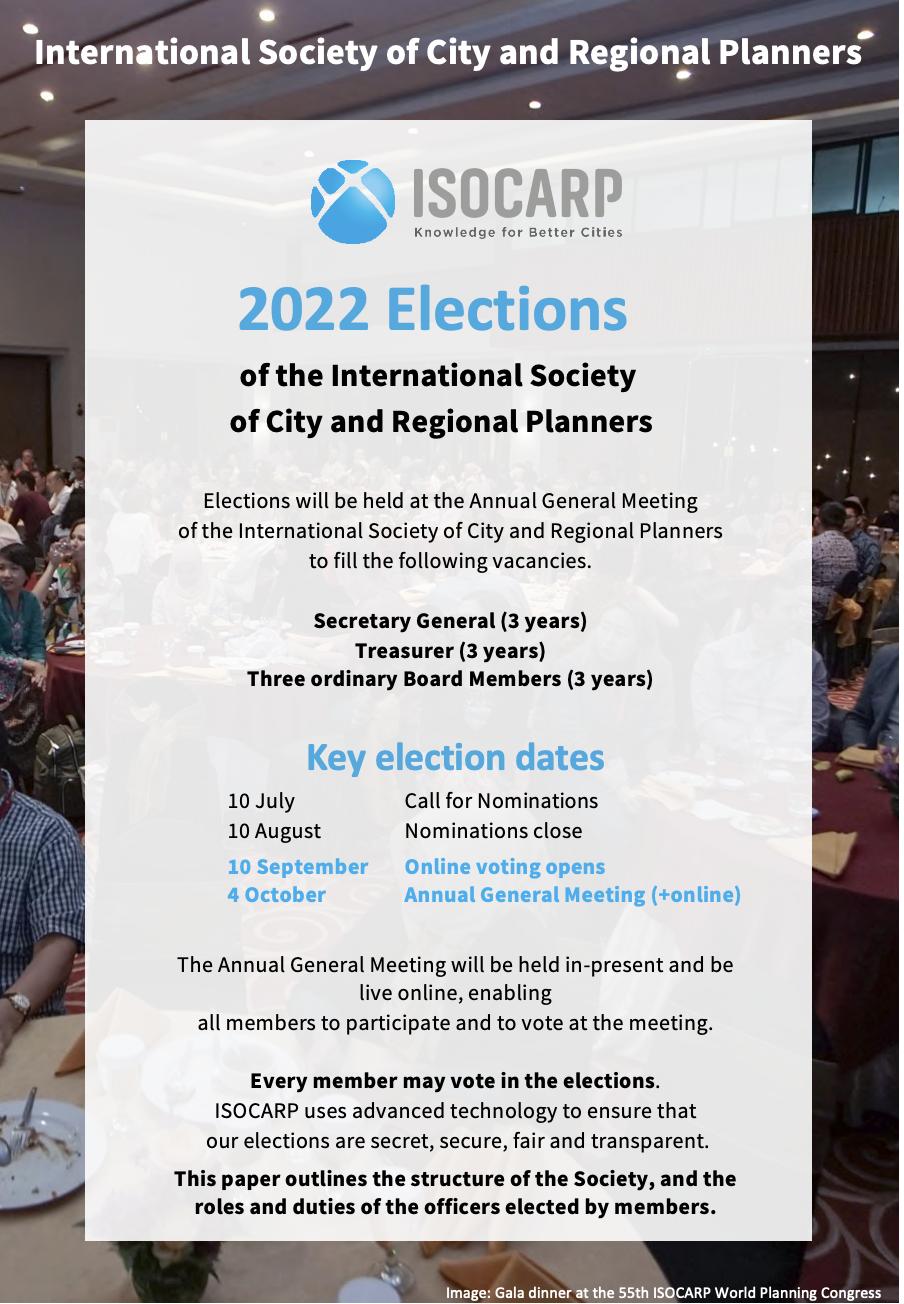A Membership Association
The International Society of City and Regional Planners is the international society for those professionally involved in city and regional planning.
The Society is registered in the Netherlands as a membership association. Its constitution empowers the members to govern the Society.
At General Meetings (which can be online, allowing all members to participate) the members make the rules, decide on directions, approve the budget, and elect the Board at the Annual General Meeting (AGM).
The Board
The Board is responsible to the members for the management of the Society, overseeing projects, programmes, events and the administration of the Society. The Board develops new policies and programmes and prepares for the General Meetings where the members make the ultimate decisions.
The Board has eleven members, or twelve when – every third year – there is a President Elect.
Normally, the members of the Board are President, elected to that office, Secretary General, elected to that office, Treasurer, elected to that office, and eight ordinary Board Members. These officers are elected for a term of three years, in an honorary capacity (unpaid).
The Executive Committee
The Board appoints a subcommittee called the Executive Committee, consisting of President, Secretary General, Treasurer, and two other Board Members. The Executive Committee is responsible to the Board for day-to-day management of the Society, including matters that the Board has explicitly delegated to the Executive Committee. The Board has assigned to the Executive Committee the responsibility for organising the World Planning Congress.
Elections in 2022At the next Annual General Meeting, to be held at the 58th World Planning Congress in October 2022, elections will be held to fill several vacancies.
Accordingly, elections will be held at the AGM:
|
Roles and duties of the offices to be elected in 2022
Secretary General
The Secretary General is seen as the second senior member of the Board, assisting the President and deputising for the President when the President is not available.
The Secretary General has executive powers on matters explicitly delegated to the Secretary General by the Board.
The Secretary General is an ex officio member of the Executive Committee. The Secretary General is in charge of the assessment and acceptance of applications for membership of the Society.
The Secretary General is often the first point of contact for agencies and other entities with which the Society maintains relationships and takes the lead on contracts and employment matters.
The Secretary General is generally responsible for the administration of the society, preparing papers for meetings and the minutes, preparing reports and proposals relating to administrative matters, and overseeing the office and the website.
Treasurer
The Treasurer has executive powers on matters explicitly delegated to the Treasurer by the Board.
The Treasurer is an ex officio member of the Executive Committee.
The Treasurer is generally responsible for the financial administration of the Society, including communication with the Secretariat, bookkeepers and accountants, advising the Board on financial matters, preparing proposals relating to financial issues, overseeing financial resources, and approval of payments by the Society.
More specifically, the Treasurer is responsible for preparing the monthly financial reports to be presented to the Board, preparing the annual report to be shared with ISOCARP members before the AGM, and reporting to ISOCARP members on the financial status of the Society during the AGM.
Board Member
(includes President, Secretary General and Treasurer)
The Board of a self-governing association is a special kind of entity.
The Board exercises its powers and duties when in session at a Board meeting, since the members do not otherwise possess executive authority (other than roles explicitly delegated to individual members by the Board). All members are equal, and equally share their powers and responsibilities.
Each member of the International Society of City and Regional Planners elected to the Board has an opportunity to contribute to the Society, to work energetically in the members’ interests, to champion new ways of doing things, to improve the Society’s operations and programmes, and to help build the Society’s effectiveness, relevance, reach, and profile. In doing so, each Board Member faces challenges, gains experience, learns much about city and regional planning around the world, is introduced to new people and organisations, and of course makes new friends.
Each Board Member is also like a company director. Each Board Member must ensure that the Society manages its finances and assets and remains solvent. Board Members are collectively and individually accountable if it does not.
Each Board Member is expected to actively participate in decision making, to take on one or more specific projects or programmes, to be responsible for tasks assigned to them by the Board, and to support the other Board Members in their activities. Each Board Member is expected to attend in person two meetings of the Board every year (one of which is held in conjunction with the World Planning Congress), and to actively participate in the monthly online Board meetings. Additional opportunities to contribute to the Society might be to chair the Scientific Committee (should the Secretary General not take this role) and to join the Executive Committee (and therefore be collectively responsible for the organisation of the World Planning Congress).
Other opportunities involve challenging and rewarding roles in UPATs, YPPs, the World Planning Congress, the Institute, publications, technical assistance, training, international planning projects, relationships with international organisations, regional events, fund raising, building online networks, supporting and shaping the website www.isocarp.org, contributing to the Society’s social media channels, and new initiatives that Board Members may propose to the Board.
